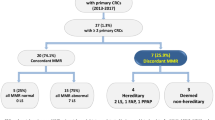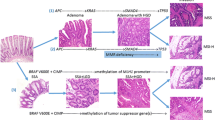Abstract
PURPOSE: Metachronous colorectal cancer still occurs in a small percentage of patients, despite colonoscopic surveillance. Cancers in hereditary nonpolyposis colorectal cancer for which there is a high risk of metachronous cancer show distinctive DNA changes termed replication errors (RER+). Ten to 20 percent of sporadic colorectal cancers are also RER+. The aim of this study was to identify factors predictive of metachronous colorectal cancer, despite colonoscopic surveillance. Clinicopathologic characteristics and RER status of cancers were examined. METHODS: Colorectal cancer patients, who entered into a surveillance program of being examined with colonoscopy within six months of surgery and then at intervals of three years thereafter, were reviewed. The 433 patients compliant with the protocol who had had more than one colonoscopy had been followed up for a mean of 3.8±2.2 years. DNA was extracted from archival paraffin-embedded cancer tissue for determination of RER status. RESULTS: Ten cases of metachronous cancer were identified, giving a rate of 0.61 percent per year. The site of the index cancer in patients who later developed metachronous cancer was predominantly proximal (P =0.0007), and these cancers were more likely to have mucinous histology (P <0.0005). Three of 10 (30 percent) index cancers were RER+, which was not significantly different from unselected series of control colorectal cancers in which 20 of 108 (18.5 percent) were RER+. DISCUSSION: This study documents the rate of metachronous cancer among patients compliant with a defined colonoscopic screening program and suggests that the risk is highest in patients with a proximal mucinous cancer. RER status does not appear to be a very strong predictive factor, and this study does not support its use as a guide to the frequency of surveillance colonoscopy. More data would be required to determine if RER positivity conferred a relative risk of 3.3 or less.
Similar content being viewed by others
References
Bülow S, Svendsen LB, Mellemgaard A. Metachronous colorectal carcinoma. Br J Surg 1990;77:502–5.
Svendsen LB, Bülow S, Mellemgaard A. Metachronous colorectal cancer in young patients: expression of the hereditary nonpolyposis colorectal cancer syndrome? Dis Colon Rectum 1991;34:790–3.
Cali RL, Pitsch RM, Thorson AG,et al. Cummulative incidence of metachronous colorectal cancer. Dis Colon Rectum 1993;36:388–93.
Winawer SJ, Zauber AG, Ho MN,et al. Prevention of colorectal cancer by colonoscopic polypectomy. N Engl J Med 1993;329:1977–81.
Evers BM, Mullins RJ, Matthews TH, Broghamer WL, Polk HC. Multiple adenocarcinomas of the colon and rectum: an analysis of incidences and current trends. Dis Colon Rectum 1988;31:518–22.
Luchtefeld MA, Ross DS, Zander JD, Folse JR. Late development of metachronous colorectal cancer. Dis Colon Rectum 1987;30:18–4.
Winawer SJ, Zauber AG, O'Brien MJ,et al. Randomized comparison of surveillance intervals after colonoscopic removal of newly diagnosed adenomatous polyps. N Engl J Med 1993;328:901–6.
Jass JR, Stewart SM. Evolution of hereditary nonpolyposis colorectal cancer. Gut 1992;33:783–6.
Mecklin J-P, Järvinen H. Treatment and follow-up strategies in hereditary nonpolyposis colorectal carcinoma. Dis Colon Rectum 1993;36:927–9.
Young JP, Searle J, Buttenshaw R,et al. AnAlu VpA marker on chromosome 1 demonstrates that replication errors manifest at the adenoma-carcinoma transition in sporadic colorectal tumours. Genes Chromosom Cancer 1995;12:251–4.
Kim H, Vogelstein B, Hamilton SR. Clinical and pathological characteristics of sporadic colorectal carcinomas with DNA replication errors in microsatellite sequences. Am J Pathol 1994;145:148–56.
Hutter RV, Sobin LH. A universal staging system for cancer of the colon and rectum. Arch Pathol Lab Med 1986;110:367–368.
Levi S, Urbano-Ispizua A, Gill R,et al. Multiple K-ras mutations in cholangiocarcinomas demonstrated with a sensitive polymerase chain reaction technique. Cancer Res 1991;51:3497–502.
Miller SA, Dykes DD, Polesky HF. A simple salting out procedure for extracting DNA from human nucleated cells. Nucleic Acid Res 1988;16:1215.
Young J, Leggett B, Gustafson C,et al. Genomic instability occurs in colorectal carcinomas but not in adenomas. Hum Mutat 1993;2:351–4.
Spirio L, Joslyn G, Nelson L, Leppert M, White R. A CA repeat 3:0-70 kb downstream from the adenomatous polyposis coli gene. Nucleic Acids Res 1991;19:6348.
Weissenbach J, Gyapay G, Dib C,et al. A second generation linkage map of the human genome. Nature 1992;359:794–801.
Engelstein M, Hudson TJ, Lane JM,et al. A PCR-based linkage map of chromosome 1. Genomics 1993;15:251–8.
Zuliani G, Hobbs H. Tetranucleotide repeat polymorphism of the LPL gene. Nucleic Acids Res 1990;18:4958.
Makela TP, Hellsten E, Vesa J. An Alu variable polyA repeat polymorphism upstream of L-myc at 1p32. Hum Mol Genet 1992;1:217.
Emi M, Fujiwara Y, Nakajima T,et al. Frequent loss of heterozygosity for loci on chromosome 8p in hepatocellular cancer, colorectal cancer and lung cancer. Cancer Res 1992;52:5368–72.
Vogelstein B, Fearon ER, Hamilton SR,et al. Genetic alterations during colorectal tumor development. N Engl J Med 1988;319:525–32.
Rennert G, Robinson E, Rennert HS, Neugut AI. Clinical characteristics of metachronous colorectal cancers. Int J Cancer 1995;60:743–7.
Reilly JC, Rusin LC, Theuerkauf FJ Jr. Colonoscopy: its role in cancer of the colon and rectum. Dis Colon Rectum 1982;25:532–8.
Kiefer PJ, Thorson AG, Christensen MA. Metachronous colorectal cancer: time interval to presentation of a metachronous cancer. Dis Colon Rectum 1986;29:378–82.
Author information
Authors and Affiliations
Additional information
Supported by a grant from the Queensland Cancer Fund, Herston, United Kingdom. During this work, Dr. Young and Dr. Buttenshaw were supported by the Department of Pathology at the Royal Brisbane Hospital, Herston, United Kingdom.
About this article
Cite this article
Leggett, B.A., Cornwell, M., Thomas, L.R. et al. Characteristics of metachronous colorectal carcinoma occurring despite colonoscopic surveillance. Dis Colon Rectum 40, 603–608 (1997). https://doi.org/10.1007/BF02055387
Issue Date:
DOI: https://doi.org/10.1007/BF02055387




